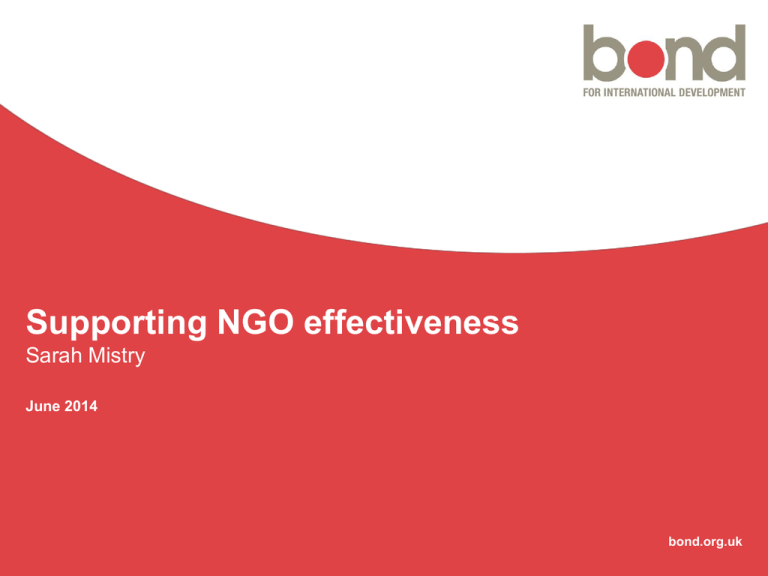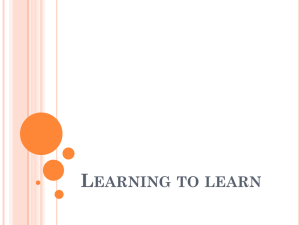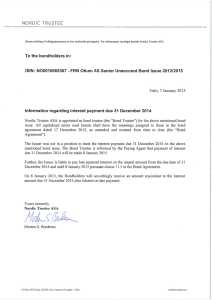
Supporting NGO effectiveness
Sarah Mistry
June 2014
bond.org.uk
Introduction
Supporting NGO Effectiveness and fostering social accountability
1.
A quick introduction to Bond
2.
Why do NGOs need to be more effective?
3.
What are the levers of change to improve NGO effectiveness?
4.
Case study: Evidence Principles
5.
What does the future hold?
6.
Transferable lessons
bond.org.uk
2
About Bond
The membership body for UK
international development
organizations:
•
Founded 1993 by 61 NGOs
•
400+ members
Our strategy is to:
•
Connect
•
Influence
•
Strengthen
bond.org.uk
Image by Jerry Wang
3
What do we do?
Connect
Membership &
Communications
Influence
Strengthen
Policy &
Advocacy
Effectiveness &
Learning
bond.org.uk
4
Why effectiveness focus?
• More impact (quality, reach,
influence)
• Better value for money
• Performance improvement
• Adaptive learning
• Accountability, communication
of value
• Sustainability (of outcomes not
organization)
bond.org.uk
5
Theory of Change
Why is Bond well placed to help
NGOs improve their effectiveness?
•
Planning
•
Measuring and communicating
results
•
Learning and adaptation
•
Value for money
•
Transparency and accountability
•
Funding practices
Learning
Accountability
Funding
bond.org.uk
6
Levels of change
In order to bring about change Bond is working at multiple levels:
•
Individuals – to seed good practice
•
Organizations – to enable and embed good practice
•
Sector – to share and establish good practice
•
Donors – to enable, incentivize and reward good practice
bond.org.uk
7
Effectiveness activities
This translates into effectiveness activities centered on five areas:
Effectiveness
services
Sector
effectiveness
Funding policy
Transparency &
accountability
Evidence &
learning
bond.org.uk
8
Case study: The Evidence Principles
Principles and checklist are for
assessing and improving the
quality of evidence.
•
Practical tool used when
commissioning, designing and
reviewing evidence-based work.
•
Being used in 6 ways; 85% of
organisations report positive change.
•
Also a ‘line in the sand’ – a locus for
conversation with donors on evidence.
Download: http://www.bond.org.uk/principles
bond.org.uk
9
Case study: The Evidence Principles
...
4
Strong evidence
Are the perspectives of
beneficiaries included in
the evidence?
No beneficiary
perspectives
presented
Are the perspectives of the
most excluded and
marginalised groups
included in the evidence?
Perspectives from
Perspectives from most excluded groups presented clearly
most excluded
and integrated into analysis, and excluded groups have
... ...
groups not
validated the findings; the evidence is strongly grounded in
presented clearly
the voices of the most excluded
Are the findings disaggregated
according to sex, disability
and other relevant social
differences?
No
Findings are disaggregated according to all social differences
disaggregation of
... ... relevant to the intervention, and why these have been
findings by social
chosen has been clearly explained
differences
Did beneficiaries play an
active role in the
assessment process?
Beneficiaries had
Beneficiaries had involvement in all of the following: (1)
no involvement in
... ... designing the process (2) analysing the data (3) formulating
the assessment
the conclusions
process
1.
Voice and Inclusion
1
Weak evidence
Beneficiary perspectives presented and integrated into
... ... analysis, and beneficiaries have validated the findings; the
evidence is strongly grounded in the voices of the poor
bond.org.uk
10
Case study: The Evidence Principles
How the Evidence Principles utilize the levers and levels for change.
Practical tool that
can be applied by
individuals
Enables NGOs
to communicate
the value of their work
Shared understanding
in sector of good
practice
A mechanism
to influence donor
practice
bond.org.uk
11
What does the future hold?
But it’s not business as usual. Bond is initiating a Futures Program to
help our members adapt:
•
Changing global environment- different locations of poverty
•
Shifting power dynamics – southern leadership, civil society
•
New actors eg private sector
•
New funding models
•
Conflict, climate change
•
Public support, democracy, disintermediation…
This calls for radical adaptation and transformative thinking
bond.org.uk
12
Transferable lessons
•
Understand your theory of change, levers for change
•
The value of networks, collective action
•
The urgency of adapting to a changing environment
•
Strategic leadership combined with practical approaches
•
Peer to peer knowledge sharing
•
Learning, failing, learning again
•
People, cultures, relationships - real world / real lives
What can we learn from each other?
bond.org.uk
13
www.bond.org.uk
Regent’s Wharf • 8 All Saints Street • London • N1 9RL • United Kingdom
+44 (0)20 7837 8344 • bond@bond.org.uk • bond.org.uk
bond.org.uk
14






